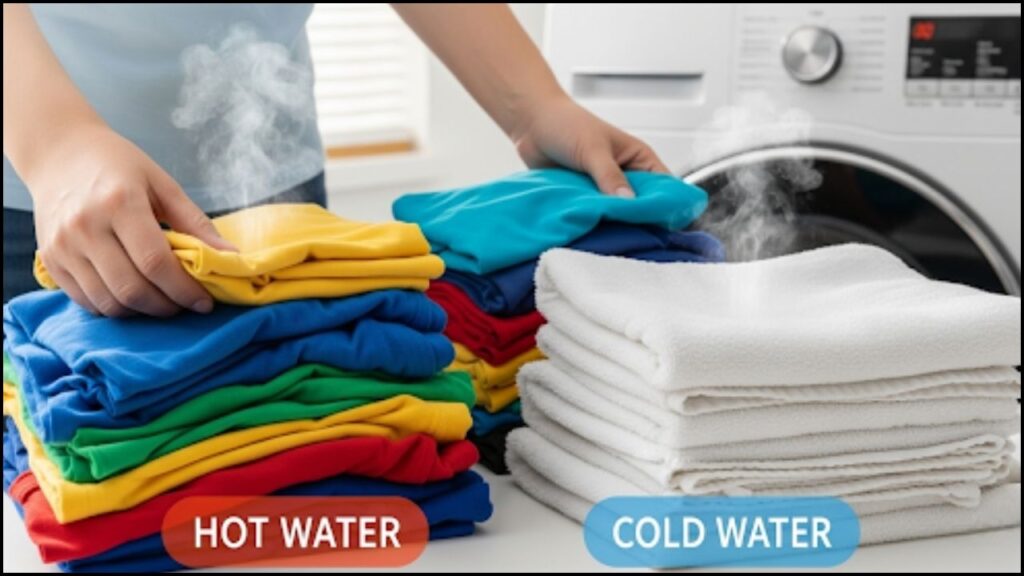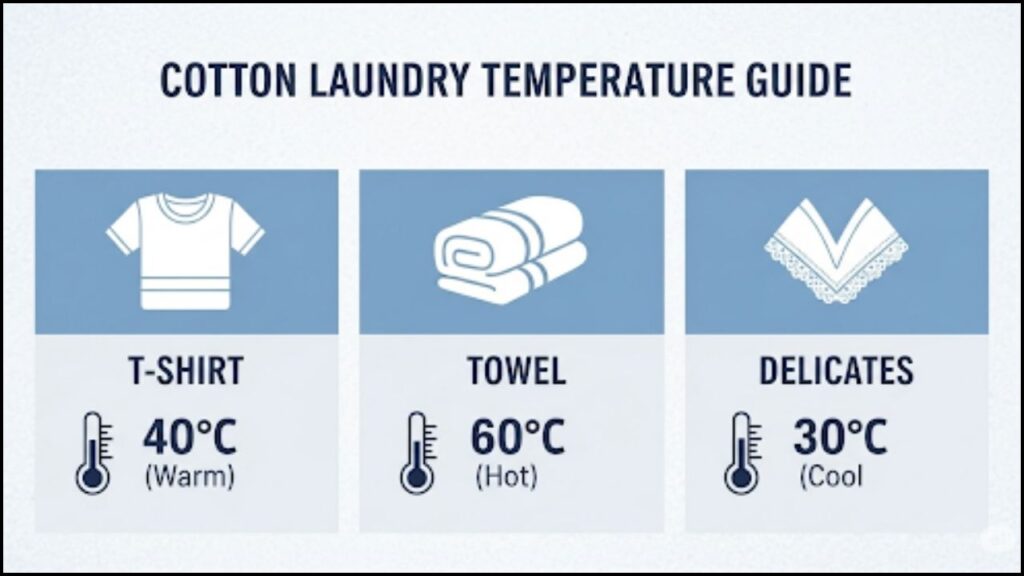For generations, hot water has been the default for achieving the cleanest laundry. However, textile care experts and appliance manufacturers now largely agree that this approach is often unnecessary and potentially damaging for everyday cotton garments. While there are specific instances where heat is beneficial, the consensus advice is to turn down the dial to preserve fabrics and save energy.

Key Takeaways: Washing Cotton at the Right Temperature
| Key Finding | Detail | Rationale & Source |
| Cold Water is the Default | For most colored cotton clothing, cold water is the safest and most effective option. | Prevents shrinking, fading, and saves significant energy. |
| Hot Water for Sanitization | Use hot water (130∘F / 54∘C or higher) for heavily soiled white cottons like bedding, towels, and underwear. | Kills bacteria, germs, and dust mites effectively. |
| Warm Water is a Compromise | Warm water offers a good balance for moderately soiled garments and durable whites. | Provides extra cleaning power without the harsh effects of high heat. |
| Check the Care Label | The garment’s care tag is the ultimate authority on how it should be laundered. | Manufacturers conduct specific tests to determine the optimal care instructions for their products. |
The Expert Consensus on Hot Water Washing
The long-held belief that hot water is superior for all laundry loads is being challenged by advancements in both textile and detergent technology. Most laundry professionals now advocate for a more nuanced approach, recommending cold water as the standard for the majority of cotton loads.
“Unless you are dealing with a sanitation issue, there is very little reason to wash your everyday cotton clothes in hot water,” said Patric Richardson, laundry expert and author of “Laundry Love.” “Modern detergents are formulated with enzymes that work exceptionally well in cold water. Using hot water can needlessly stress the fabric fibers.”
This sentiment is echoed throughout the industry. The primary reasons experts cite for avoiding hot water are to prevent damage to the garment and to reduce environmental impact. According to the U.S. Department of Energy, approximately 90% of the energy consumed by a washing machine is used to heat the water, making a switch to cold water one of the simplest ways for a household to decrease its energy consumption.
Wash Cotton in Hot Water: When to Strategically Wash Cotton in Hot Water
Despite the strong case for cold-water washing, hot water remains a critical tool for specific laundry challenges. The decision to wash cotton in hot water should be based on the item’s durability and the desired outcome.
Sanitizing Bedding, Towels, and Sick-Room Laundry
For items that harbor germs, bacteria, or allergens like dust mites, hot water is highly effective. Bed linens, bath towels, kitchen cloths, and the clothing of a sick family member are prime candidates for a hot cycle. “Hot water is your best defense for sanitization,” said a spokesperson for Whirlpool Corporation in a recent appliance guide. “Temperatures of 130∘F (54.4∘C) and above are very effective at killing most pathogens. This is particularly important for items like cotton sheets and pillowcases to control allergens.”
Tackling Heavy Stains on Durable Cottons

Hot water can also be more effective at removing certain types of stubborn, set-in stains from sturdy white cotton fabrics. Grease, oil, and some food stains may break down more easily at higher temperatures. However, experts caution this should be reserved for durable items like white cotton socks, undershirts, or work clothes that can withstand the heat without significant damage.
The Risks of Overusing Hot Water
The main drawbacks of using hot water on cotton are tangible: shrinking, color loss, and increased utility bills. Understanding these risks helps explain why laundry professionals so strongly advocate for cooler temperatures.
Fabric Shrinkage and Damage
Cotton is a natural fiber that is prone to shrinking when exposed to high heat. The hot water causes the fibers in the fabric’s weave to constrict, resulting in a garment that may no longer fit. This effect is most pronounced in 100% cotton items that have not been pre-shrunk by the manufacturer. Over time, repeated hot washes can also weaken the fibers, leading to premature wear and tear.
Color Fading and Bleeding
For colored cottons, hot water is particularly detrimental. “Heat opens up the fibers of the fabric, which can cause dye to be released into the wash water,” explained Dr. Morgan Clark, a textile scientist at the Cotton Incorporated research center. This not only leads to faded, dull-looking clothes but can also cause dyes to bleed onto other items in the load, ruining lighter-colored garments. This is why sorting laundry by color remains a critical step, especially if using warm or hot water.
The Rise of High-Efficiency Detergents
A major factor driving the shift to colder washing temperatures is the evolution of laundry detergents. The best detergent for cotton and other fabrics now contains powerful enzymes specifically designed to target stains and dirt in cold water.
“Detergent formulations have advanced significantly,” said a representative from the American Cleaning Institute, a trade association for the cleaning products industry. “Enzymes like protease break down protein stains, and amylase tackles starches. These bio-agents are often most effective in cool or warm water, not hot, as high temperatures can denature them and reduce their efficacy.”
For consumers wondering Wash Cotton in Hot Water effectively, the answer now lies as much in the detergent aisle as it does on the washing machine’s temperature dial. Reading the detergent label to ensure it is formulated for cold-water performance is key. Ultimately, the best practice is to read the care label on each garment. However, when in doubt, laundry professionals agree that cold water is the safest and most economical choice for your everyday cotton clothing, saving the heat for when it is truly needed.
How a Common Laundry Room Design Mistake Is Making Your Home Feel Smaller
